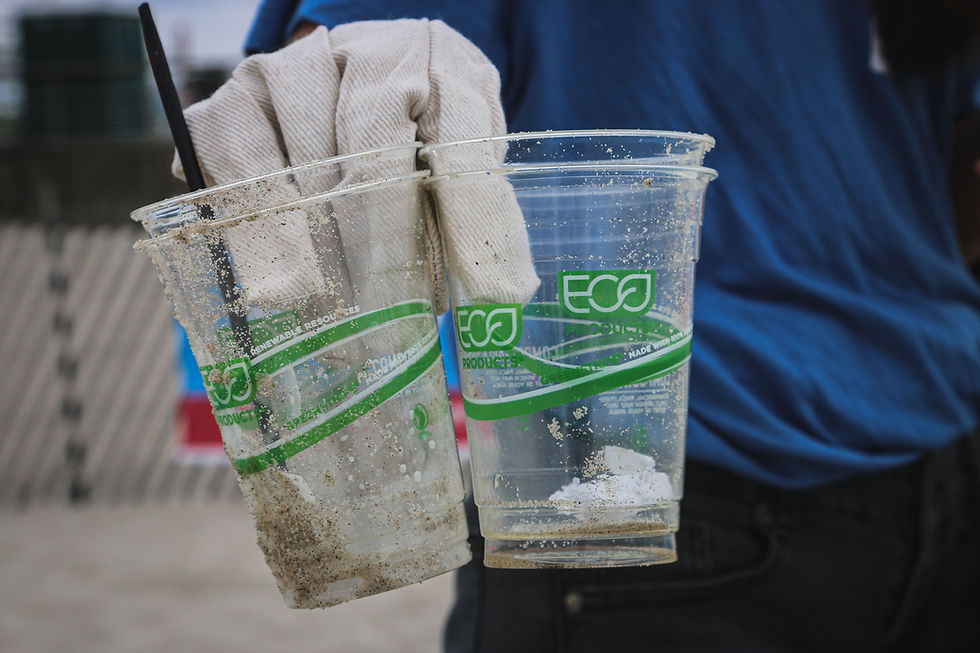
Now that saving the planet and looking after those of us on it is becoming increasingly important, many businesses and corporations advertise their products as sustainable and eco-friendly.
This new wave of businesses adapting their products and production methods to be more eco-friendly can't always be trusted, though; some businesses lie in order to seem more in touch with customers, or to seem more on-trend.
What is greenwashing?
Greenwashing is when corporations advertise their products as being good for the environment, yet the products in question aren't actually good for the environment at all. Often, businesses, brands, and corporations will participate in greenwashing to deflect attention away from the harm they are actually causing to the planet.
The current climate crisis has made consumers more aware of the products they're purchasing. Many people are trying to strive for a more eco-friendly, sustainable way of life, and the products they buy are included in this. It's becoming more trendy now to be sustainable and aware of the effect we have on our planet, and corporations are scrambling to appeal to consumers by labelling their company as eco-friendly, or leading their customers to believe their company is taking steps towards the greener side.
Environmental activist Greta Thunberg called out the fashion industry for greenwashing in a Twitter post.
“This is almost never anything but pure greenwash[ing]. You cannot mass produce fashion or consume ‘sustainably’ as the world is shaped today. That is one of the many reasons why we will need a system change.” - Greta Thunberg
Companies spend more time and money pretending to be green through advertisements and marketing, instead of actually implementing changes to their business that will minimize the impact they have on the environment. Some cases of greenwashing can be accidental, caused by a lack of knowledge on true sustainability, though most cases are intentional carelessness and further harm our environment.
How to spot greenwashing
Many brands will use terms such as 'eco friendly' and 'sustainable', but nobody is restricted from using these terms, so it can be difficult to know whether the brand is being genuine. One way to know for sure whether a brand is being honest, is to look for stamps of approval such as a B Corp certification, or
Fair Trade certification.
Brands will also use vague wording in their advertising such as 'natural', but even natural things can be harmful for us and the environment. Take care with reading product labels and descriptions to know what something is really made of.
If there is a lack of transparency regarding the production of the products then it is best that you don't purchase it, or from that brand! It suggests that the companies have something to hide if they aren't disclosing important information about ingredients and suppliers. Let's be real: if a company is really being sustainable and environmentally friendly, they'd be open and honest about it!
Packaging advertised as recyclable and compostable may also be greenwashing. Theoretically, most plastic is recyclable, however a single-use plastic package isn't environmentally sustainable. With compostable packaging, these can be thrown on a compost heap or in a compost bin at home. However, some packaging marked as compostable often need specific conditions, and if your local council doesn't collect compostable waste, it's most likely to end up in landfill. To avoid this, try and see if there are other ways of accessing your desired product without generating so much waste: does it need packaging at all? Can it be packaged in a reusable container?
Brands that are guilty of greenwashing
There are many popular brands and corporations that have been proven guilty of greenwashing, here are some quick insights to just some of them:
H&M. In 2021, H&M were making huge efforts to present themselves as environmentally friendly through social media and window displays. H&M also released a line of "green" fashion called Conscious, however they were criticised by The Norwegian Consumer Authority for providing insufficient information regarding the sustainability of their collection. The materials used for products are unsustainable and they still operate under fast fashion. The pressure to meet fast fashion deadlines has sadly led to mistreatment of the women working at the retailers' factories and poor working conditions.
Zara & other Inditex owned brands. Zara is owned by Inditex, who also own brands like Pull&Bear, Bershka, Zara Home and Stradivarius. Despite Zara having goals set for 2025 to source their materials more sustainably, they are still using virgin synthetics that take hundreds of years to break down. They also aim to achieve a target of zero waste to landfills by 2023, however they release new styles daily and operate under the fast fashion business model.
Starbucks In 2018, Starbucks revealed a straw-less lid was going to be used for their cups, and in 2020, Starbucks revealed a prototype for eco-friendly beverage cups. The coffee industry itself has a negative impact on our environment; they depend on the consumption of large amounts of fossil fuels and natural resources. As well as this, most Starbucks stores aren't located where coffee is cultivated, which means their coffee has to be transported from thousands of miles away which has a damaging impact on our environment.
Coca-Cola In 2021, Coca-Cola revealed that they would be ditching Sprite's green plastic bottles for a clear PET (polyethylene terephthalate) plastic. This plastic is better than the original green, as it means the bottles can be collected, recycled and reused. This was a response to Kenya's plastic crisis. However, the annual Brand Audit Report revealed that Coca-Cola was the worst polluter overall globally despite promises to improve! Its branding was found littered in natural areas across 51 out of 55 countries.
“Coca cola’s latest campaign is nothing short of greenwashing. Corporate capture in the production and distribution of plastic bottles cannot be corrected through collection and recycling processes. These have proven to be unsustainable, backward and in total disregard of efforts to curb plastic pollution in our environment." - Frederick Njehu
Comments